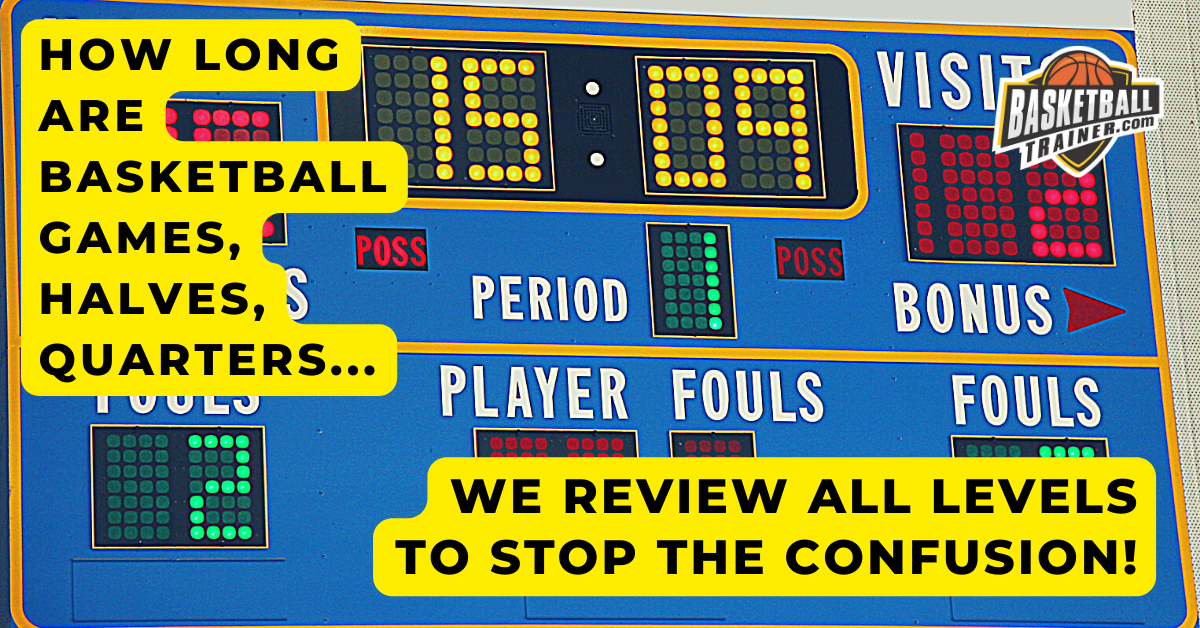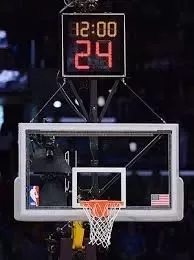There are four quarters in a standard basketball game. Each quarter lasts for 12 minutes.
Basketball games are divided into four quarters, each lasting 12 minutes. This structure allows for strategic gameplay, timeouts, and breaks. The quarter system keeps the game fast-paced and exciting for both players and fans. Teams often strategize and adjust their game plan during breaks between quarters.
Additionally, the quarter format allows for equal opportunities for both teams to showcase their skills and compete effectively. Overall, the four-quarter system is a fundamental aspect of basketball that contributes to the sport’s dynamic and competitive nature.
Breaking Down Game Time
When it comes to basketball, understanding the structure of the game and how it is divided into quarters is essential. Breaking down game time allows players, coaches, and fans to strategize, analyze, and appreciate the dynamics of each quarter. In this article, we will explore the basic structure of a basketball game and delve into the duration of quarters.
The Basic Structure Of A Basketball Game
A basketball game is divided into four quarters, each consisting of a specified duration. The purpose of these quarters is to regulate gameplay, provide equal opportunities for both teams, and allow for breaks in between.
Duration Of Quarters
How Many Quarters in Basketball? Each quarter in basketball typically lasts for 12 minutes, resulting in a total of 48 minutes of gameplay. However, it’s important to note that the actual duration of a basketball game can vary due to various factors such as timeouts, fouls, and injuries. These interruptions can extend the overall duration of the game.
During each quarter, the clock continues to run unless the game is stopped for timeouts, fouls, or other occurrences. When the clock stops, the game temporarily pauses, allowing teams to regroup, strategize, and make necessary substitutions.
It’s worth mentioning that in professional basketball, such as the NBA, there are additional rules regarding the duration of quarters and game time. For example, the NBA has specific rules for overtime periods when the game is tied at the end of regulation.
Understanding the structure and duration of quarters in basketball provides a foundation for analyzing the game, evaluating player performance, and appreciating the strategic decisions made by coaches. Whether you’re a player, coach, or fan, breaking down game time allows for a deeper understanding and enjoyment of the sport.

Credit: sports.betmgm.com
Evolution Of Game Quarters
Basketball games consist of four quarters, each lasting 12 minutes, totaling 48 minutes of gameplay. This structure ensures fair competition and strategic gameplay throughout the match.
Basketball is a fast-paced and thrilling game that has evolved significantly over the years. One of the most significant changes has been the length of game quarters. In the early days of basketball, games were played in two halves of 20 minutes each. However, as the game evolved, so did the length of quarters. Today, games are played in four quarters of 12 minutes each, but this was not always the case.
Historical Changes In Game Length
In the early days of basketball, games were played in two halves of 20 minutes each. This format was used from the inception of basketball until the late 1940s. However, as the game became more popular and players became more athletic, the length of quarters was increased to 12 minutes in the late 1950s. The four-quarter format was introduced in the 1970s, and it has been the standard format ever since.
Comparing Different Eras
Comparing different eras in basketball is always an interesting exercise. One of the most significant differences between eras is the length of game quarters. In the early days of basketball, games were low-scoring affairs, with scores often in the 20s or 30s. However, as the game evolved and the length of quarters increased, so did the scoring. Today, it is not uncommon to see scores in the 100s or even higher.
| Era | Game Length | Average Score |
|---|---|---|
| 1920s-1940s | 2 halves of 20 minutes | 20-40 points per team |
| 1950s-1960s | 2 halves of 20 minutes | 60-80 points per team |
| 1970s-present | 4 quarters of 12 minutes | 100+ points per team |
In conclusion, the evolution of game quarters is just one example of how basketball has changed over the years. The move to four quarters of 12 minutes each has made the game more exciting and fast-paced, resulting in higher scores and more thrilling finishes. While it is always interesting to compare different eras, it is clear that the four-quarter format is here to stay.
Pro Basketball Vs. Amateur
When it comes to the game of basketball, there are a few key differences between professional and amateur play. One of these differences lies in the structure of the game, particularly in the number of quarters played. In this section, we will explore how quarter length differs between professional basketball, specifically the NBA, and amateur basketball, such as college-level play.
Quarter Length In The Nba
In the NBA, each game is divided into four quarters. Each quarter lasts for a total of 12 minutes, resulting in a game that spans 48 minutes in total playing time. This consistent quarter length allows for a standardized game format, ensuring fairness and uniformity across all professional basketball games.
How College Basketball Differs
When it comes to college basketball, the quarter length differs from that of the NBA. Instead of playing four quarters, college basketball games are divided into two halves. Each half lasts for a total of 20 minutes, meaning that the total playing time for a college basketball game is 40 minutes.
This difference in quarter length between the NBA and college basketball can impact the pace and flow of the game. With shorter quarters in the NBA, teams may have to strategize and execute their plays more quickly, leaving less room for error. On the other hand, the longer halves in college basketball allow for more time for adjustments and potential comebacks.
It is important to note that these differences in quarter length are not the only distinctions between professional and amateur basketball. Various rules and regulations also differ between the two, such as shot clock durations and the number of personal fouls allowed.
In conclusion, the number of quarters in basketball varies between professional and amateur play. The NBA utilizes four quarters of 12 minutes each, while college basketball games are divided into two halves of 20 minutes each. These differences in quarter length contribute to the unique dynamics and strategies employed in each level of play.

Credit: basketballtrainer.com
International Play Variations
In basketball, the number of quarters played can vary depending on the league or competition. International play introduces different timing rules compared to the standard four-quarter game seen in the NBA. Understanding these variations is essential for fans and players alike. Let’s take a closer look at the international play variations, including the FIBA rules on game time and the timing used in Olympic basketball.
Fiba Rules On Game Time
Under FIBA (International Basketball Federation) rules, games are divided into four quarters, just like in the NBA. However, there are some differences in terms of the duration of each quarter. In FIBA play, each quarter consists of 10 minutes of game time, making the total game time 40 minutes.
This differs from the NBA, where each quarter is 12 minutes long, resulting in a total game time of 48 minutes. The shorter quarters in FIBA play can lead to a faster-paced game, requiring teams to make quicker decisions and adjust their strategies accordingly.
Additionally, FIBA rules include a 24-second shot clock, which is also different from the NBA’s 24-second shot clock. This variation can impact the pace of the game and the offensive strategies employed by teams.
Olympic Basketball Timing
In Olympic basketball, the timing rules differ further from both the NBA and FIBA play. Olympic basketball games consist of four quarters, but each quarter is only 10 minutes long, similar to FIBA rules. Therefore, the total game time for Olympic basketball is also 40 minutes.
However, it’s important to note that Olympic basketball introduces a unique timing rule called the “continuous clock.” This means that the clock does not stop in certain situations, such as free throws or timeouts, resulting in a faster-paced game compared to regular FIBA play.
With the shorter quarters and the continuous clock, Olympic basketball provides a high-intensity and action-packed experience for both players and spectators.
Summary
International play variations in basketball bring different timing rules to the game. FIBA play features 10-minute quarters, while Olympic basketball also adopts the same timing. However, Olympic basketball introduces the continuous clock rule, which keeps the game flowing without stopping the clock in specific situations. These variations add excitement and a unique flavor to international basketball competitions.
Impact Of Quarters On Game Dynamics
Strategy Adjustments
Teams often adjust their strategy in each quarter to exploit the strengths of their players and capitalize on the weaknesses of their opponents. Coaches strategically utilize timeouts to re-strategize and make pivotal changes in the game plan.
Player Stamina And Performance
Players’ stamina and performance are crucial factors affected by the division of the game into quarters. The short breaks between quarters allow players to rest and recuperate, ensuring that they can maintain peak performance throughout the game.

Credit: pelicandebrief.com
Halftime And Breaks
In basketball, halftime and breaks play a crucial role in providing players with the opportunity to rest, strategize, and regain their energy for the remainder of the game. Understanding the duration of halftime and the breaks between quarters is essential for both players and fans.
Understanding Halftime Duration
Halftime in a basketball game typically lasts for about 15 minutes. During this time, players retreat to their respective locker rooms to rest, receive coaching, and make any necessary adjustments to their game plan. Meanwhile, spectators often utilize this break to grab refreshments, visit the restroom, or engage in halftime entertainment activities.
Time Between Quarters
Between the first and second quarters, as well as the third and fourth quarters, there is a standard break of 2 minutes. This allows teams to regroup, make substitutions, and receive brief coaching. Additionally, it provides the audience with a moment to catch their breath and anticipate the upcoming action.
Overtime Scenarios
In basketball, overtime occurs when the score is tied at the end of regulation play. Let’s explore how overtime works and some notable overtime games.
How Overtime Works
- Overtime consists of one 5-minute period.
- The team with the most points wins.
- Games can have multiple overtimes.
Notable Overtime Games
- 1976 NBA Finals Game 5: Celtics vs. Suns
- 1995 Western Conference Semifinals Game 7: Rockets vs. Suns
- 2006 Western Conference First Round Game 6: Mavericks vs. Spurs
Timekeeping And Technology
When it comes to basketball, timekeeping and technology play crucial roles in the game. Let’s explore how advancements in timekeeping have shaped the sport.
Role Of The Shot Clock
The shot clock enforces a 24-second time limit for teams to attempt a shot.
Advancements In Timekeeping
Modern technology has introduced precision timing tools like LED scoreboards.
Frequently Asked Questions
How Many Quarters Are There In A Basketball Game?
In a standard basketball game, there are four quarters, each lasting 12 minutes. This adds up to a total game time of 48 minutes. Overtime may be played if the score is tied at the end of the fourth quarter.
What Happens At The End Of Each Quarter In Basketball?
At the end of each quarter, teams change baskets. There is a short break for rest and strategy discussions, known as a quarter break. The game resumes with a jump ball or inbound pass to start the next quarter.
Why Are There Quarters In Basketball Games?
Dividing the game into quarters allows for strategic breaks, enhances the flow of the game, and provides opportunities for teams to make adjustments. It also creates a rhythm for fans and broadcasters, maintaining excitement throughout the game.
Conclusion
Basketball is an exciting and fast-paced sport that requires a great deal of skill and strategy. As we have learned, there are four quarters in a standard basketball game, each lasting 12 minutes. This means that players must be able to maintain their energy and focus for a full 48 minutes in order to succeed.
By understanding the rules and strategies of the game, players and fans alike can fully appreciate the excitement of basketball and all that it has to offer.


